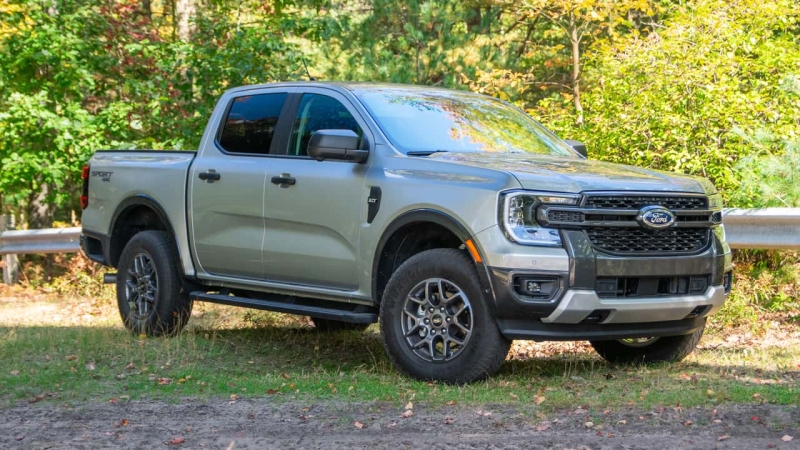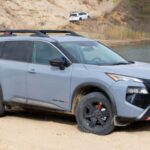Unless you’re towing an aircraft carrier, the Ranger is all the truck you need.
Photo by: Christopher Smith / Motor1 Christopher Smith  By: Christopher Smith
By: Christopher Smith
- X
Share Comment
Ford sold almost 200,000 F-Series pickups (F-150, F-250, and F-350) from July through September, compared to just 15,500 Rangers during the same period. Frankly, I have no idea why. Next to a typical full-size, half-ton truck, the Ranger sits just as high, has similar truck looks, truck tires, and a truck frame, and it tows 7,500 pounds. That’s more than enough to pull a snazzy 21-foot speedboat or a 35-foot travel trailer.
It only took me a half-hour driving a Ranger XLT 4×4 to realize it was all the truck I needed. And I’d bet a box of Stetsons that it would satisfy a majority of half-ton truck owners, too. But alas, the terms mid-size and four-cylinder are four-letter words in the truck-centric US market. Perhaps the Ranger can change that.
| Quick Specs | 2024 Ford Ranger XLT |
| Engine | Turbocharged 2.3-Liter Inline-Four |
| Transmission | Ten-Speed Automatic |
| Output | 270 Horsepower / 310 Pound-Feet |
| Max Towing | 7,500 Pounds |
| Base Price / As Tested | $41,449 / $46,619 |
 Photo by: Christopher Smith / Motor1
Photo by: Christopher Smith / Motor1
If it sounds like I’m fond of the Ranger, you’re right. Ford took a major step in the right direction with the 2024 redesign, bringing it closer style-wise to the F-150. Mimicking the look of America’s best-selling vehicle certainly isn’t a bad thing, but here’s what I really dig about the Ranger: It has a big-truck persona in a vehicle that’s easier for everyday life. By that I mean, shuffling people to the store, the restaurant, or grabbing a coffee at Starbucks. I know plenty of full-size truck owners are adept at wheeling their 19-foot pickups in tight quarters, but how often do you see a Ram 1500 taking up two spaces at Walmart?
That’s not a slam against full-size owners, just a nod to their trucks being a tad unwieldy for some. I drive a 2018 Chevrolet Silverado 1500 Z71 on a regular basis, but in the Ranger, I have better forward visibility thanks to a hood that actually slopes a little. It’s easier to maneuver in traffic. And to my surprise, it was better at towing my 15-foot utility trailer. That had nothing to do with the optional trailer towing tech, either. I had an easier time reversing with the Ranger’s 128.7-inch wheelbase, which is 17.0 inches shorter compared to an F-150 SuperCrew. Unless you’re towing an aircraft carrier, bigger isn’t always better.
That said, the Advanced Towing and Tech Packages are smart add-ons, especially if you’re doing legit truck stuff or plan to push the boundaries of the Ranger’s 7,500-pound tow rating. This is how you get the trailer backup assist, a trailer brake controller, and all the nifty tech like automatic light testing that even seasoned trailer jockeys appreciate. It also adds additional parking sensors and adaptive cruise control with speed-sign recognition, and that’s in addition to Ford’s standard-issue Co-Pilot360 driver-assist suite.
 Photo by: Christopher Smith / Motor1
Photo by: Christopher Smith / Motor1
I know V-8 power is synonymous with truckin’ in the USA, but the Ranger’s 2.3-liter turbo-four is just fine. It makes 270 horsepower and 310 pound-feet of torque, which doesn’t sound like much until you remember a 4×4 Ranger is roughly 4,400 pounds—1,000 pounds lighter than a comparable F-150. Ford lists the torque peak at 3,000 rpm, which rolls in like a gentle tide as I throttle up with a trailer load of mulch in tow. It’s just about perfect for light-to-medium trailering, balancing thrust with minimal power surges unless you really step on it. Based on this experience, I’d hook up a 7,000-pound load and head out without a second thought.
Sans trailer, my butt dyno tells me the four-pot Ranger is just as fast as my 5.3-liter Silverado. It soaks up highway miles like a thirsty traveler thanks to a suspension that’s surprisingly compliant for a smaller four-wheel drive truck. It took the broken 10-mile stretch of I-75 near Flint like a boss, so much so that I questioned whether the highway is really that bad (it is, trust me). And after 700 miles, the Ranger’s computer showed an average of 23.7 miles per gallon—beating the EPA combined rating by almost 2 mpg.
 Photo by: Christopher Smith / Motor1
Photo by: Christopher Smith / Motor1  Photo by: Christopher Smith / Motor1
Photo by: Christopher Smith / Motor1
I only wish the interior was a bit more dapper. In XLT trim, the greenhouse is dull with featureless gray and black plastic trim amid gray soft-touch surfaces. The standard 8.0-inch digital instrument cluster mirrors this presentation but in the best possible way, displaying information clearly and pleasantly without drama. It fits the Ranger XLT’s primary mission, and on the steering column, an actual place to insert and turn a metal key. Some might consider this antiquated in the age of push-button ignition. Others (like me) who constantly forget if the fob is in a pocket, purse, or the black hole between the seat and console will love it.
There are other physical controls, too. Ford keeps basic functions for audio and climate settings either on the steering wheel or beneath the standard 10.0-inch portrait touchscreen. I much prefer portrait layouts to landscape designs like those in the Chevrolet Colorado and Toyota Tacoma, and the optional 12.0-inch screen (part of the 301A Equipment Group) is even better. The size and configuration make it easy to use while on the go, though it did have some frustrating lag at times. It’s a minor gripe, except when trying to adjust airflow settings for the climate control.
 Photo by: Christopher Smith / Motor1
Photo by: Christopher Smith / Motor1
Let me say a few words about maneuverability. Ford lists the Ranger’s turning circle at 42.5 feet, approximately four feet less than an F-150 SuperCrew. It sure feels bigger than that behind the wheel, especially when maneuvering through a narrow forest trail. The Colorado and Tacoma do slightly better, but I acclimated to the truck’s needs by the time it left my care. One thing I didn’t get used to was the road and wind noise. It’s not bad by any means, but onrushing air and humming tire tread were noticeable enough at highway speeds to be a topic of discussion.
However, none of these foibles, even added together, are dealbreakers for the Ranger. I’d have it over everything in the mid-size group and even the F-150. So I ask again—why does Ford sell so many more F-150s than Rangers? Let’s talk about price.
 Photo by: Christopher Smith / Motor1
Photo by: Christopher Smith / Motor1  Photo by: Christopher Smith / Motor1
Photo by: Christopher Smith / Motor1
The 2024 Ranger XLT 4×4 I drove costs $46,619. That includes the XLT base price of $39,490, plus $945 for the 301A package, $2,305 for the Advanced Towing and Tech packages, a few tidbits like running boards, and Ford’s destination charge. Right now, you’re probably thinking $46,619 is enough to get an F-150, and you’re right. But it’s not that simple.
That kind of money will get you a two-wheel drive F-150 STX with absolutely no options. It’s also the extended cab instead of a full four-door truck, so you’d lose interior space in the process. Stepping down to the entry-level XL gets a SuperCrew at the Ranger’s price point, but once again, it’s a zero-option truck. That means two-wheel drive, steel wheels, and a plain gray interior with vinyl floors.
If you want a new F-150 comparable to this Ranger XLT, it costs $61,300. Nix the towing package and you whittle that under $60,000, but if you aren’t towing anything of significance, why not save $15,000 and get the Ranger?
Realistically, I suspect buyers are turning to the used market for something bigger instead of “stepping down” to a Ranger, and I can’t blame them. Driving a full-size pickup is far more about pride than practicality, and few vehicles inspire the masses like the F-150. But it certainly does a disservice to the Ranger, which isn’t a step down at all. In fact, it has a full-size heart that wholly outshines its mid-size rank.
Gallery: 2024 Ford Ranger XLT 4×4 Review
Christopher Smith / Motor1
Competitors
- Chevrolet Colorado
- GMC Canyon
- Toyota Tacoma
- Nissan Frontier
Get the best news, reviews, columns, and more delivered straight to your inbox, daily. back Sign up For more information, read our
Privacy Policy and Terms of Use.
2024 Ford Ranger XLT
Engine Turbocharged 2.3-Liter I-4
Output 270 Horsepower / 310 Pound-Feet
Transmission 10-Speed Automatic
Drive Type Four-Wheel Drive
Seating Capacity 5
Efficiency 20 City / 24 Highway / 22 Combined
Weight 4,415 Pounds
Ground clearance 9.3 Inches
Towing 7,500 Pounds
Payload 1,711 Pounds
Base Price $41,449
As-Tested Price $46,619
On Sale Now
Share this Story



